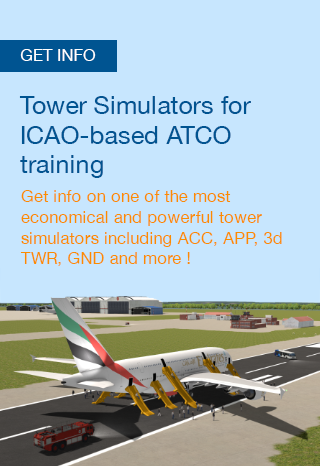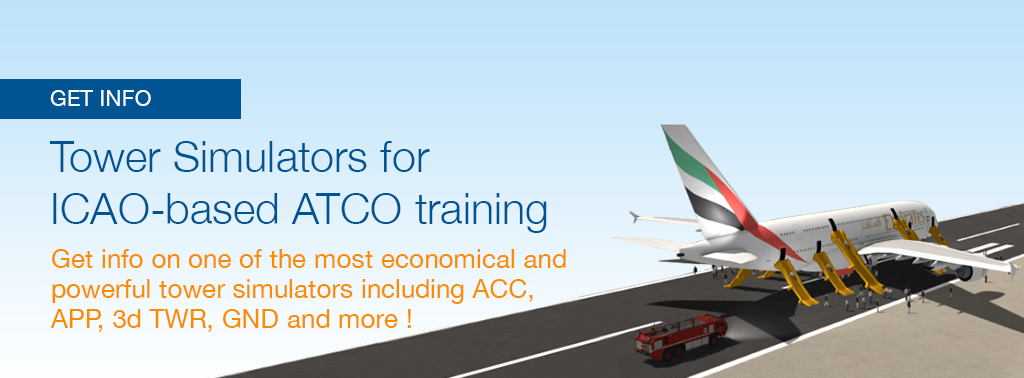Simulator training is key for developing the required skill set necessary for the provision of air traffic control services.
Air Traffic Control (ATC) is considered as one of the most challenging professions in the world. In Air Traffic Control Services, we are supposed to make a quick decision.
The decisions being made should not only be quick they, should be right as well. The main objective to make these decisions is to ensure the safe, orderly and expeditious flow of air traffic. These objectives are achievable by employing core skills that every ATC officer - whether ATCO or ATSEP must possess like quick-decision making, good communication skills, stress-resistance, multi-tasking ability, pressure-handling, good memory, and spatial awareness.
Some of the skills which can be enhanced with the use of simulation include:

TECHNICAL SKILLS
We cannot ignore the controller’s interaction with software being installed for specific purposes in support of air traffic services.Visualize an air traffic controller working environment where a controller is required to communicate with adjacent FIR to pass information related to an aircraft.
There are different channels to communicate starting from digital communication to the Landline facility. He is also required to adjust radar scope by changing its visual features like zoom in, zoom out, etc.
The controller is required to generate flight progress strips. To accomplish this task a controller utilizes an on-screen digital input form to insert the required information.
Once the required information is inserted, the flight progress strips are being generated in electronic or printed form. To perform these tasks whether simple or complex a controller requires to be equipped with knowledge related to these processes, tools, equipment, and services. He also requires the ability to perform these tasks.
Based on the above stated information we can define technical skills related to our profession as follows:
“Technical skills are the knowledge and abilities to accomplish computer-related duties as well as other specified tasks involving technology and tools”.
IMPORTANCE OF TECHNICAL SKILLS
Technical skills are important for several reasons.
- They can help you work more efficiently
- They can boost your confidence
- Make you a more valuable candidate for employers.
- Allow better multitasking in a challenging and complex role.
- Increase the capability to resolve multifaceted issues.
 FUNCTIONAL EXPERTISE
FUNCTIONAL EXPERTISE
Consider an air traffic control officer who has obtained radar rating after undergoing a proper radar course supplemented with simulator training.
Now he is performing a mathematical calculation to calculate the crossing time of two aircraft flying on the same route, giving clearance to an aircraft for performing the specific maneuver, applying different separation standards to keep aircraft a safe distance from each other.
All of these tasks require a skill set that is limited to radar control. This “Radar Control” is a specified function within the domain of Air Traffic Control Services.
Hence, we can define Functional expertise as those skills that are related to a specific segment of a field. For instance, as we know the sale is a function of marketing hence skills of a Sales Manager that help him in performing functions related to Sales are functional expertise.
Let us understand it in another way “Functional expertise is knowledge related to a specific function. This knowledge helps in building concepts. These concepts explain the nature of this function.”
IMPORTANCE OF FUNCTIONAL EXPERTISE
- Functional expertise increases the efficiency of an individual in a specific and system as a whole.
- Increase the outcome of an activity or a process through perfection in skills.
PROBLEM-SOLVING COMPETENCE
In air traffic control services, we are frequently encountering a problematic situation. As per the nature of the job and its requirements air traffic controllers are required to solve such problems.
There are standard ways of dealing with expected problems. These standards are predefined and so are the ways to resolve a specific problem. These predefined standards are called Standard Operating Procedures. The SOP is an authentic document developed in the light of ICAO and other required regulations about air traffic services.
Air traffic controllers get handy with these procedures after utilizing knowledge from these documents and practicing their application. When trainers create an emergency the controllers try to resolve such problematic situations through application of possible ways defined in required standard operating procedures. And in this way, the problem-solving technique is attained and improved.
Hence, we can define the problem solving competence as “skills which help us in finding a solution to a particular problem.”
DECISION MAKING COMPETENCE
 Decision making is a process that is based on such skills which help us in finalizing and selecting an alternate. Let us consider a situation where two aircraft are reciprocal to each other and are close enough to cause loss of separation.
Decision making is a process that is based on such skills which help us in finalizing and selecting an alternate. Let us consider a situation where two aircraft are reciprocal to each other and are close enough to cause loss of separation.
Now based on the rules of the air and SOP an air traffic controller under such circumstances should direct both aircraft to turn right and make a specific number of orbits. By doing so aircraft get apart from each other.
At the same time controller also has an option to make both aircraft separate by assigning a different level to one of the aircraft. It is now based on the intuition of the controller to decide which option will be most suitable, Here the controller is required to select one option out of two.
This process of selection is called decision making. The controller is free to make a choice but he will be answerable if the choice has jeopardized the safety. The best practice is to utilize an option that is supported by ICAO docs and SOP. Because these recommended options are tested and already calculated for the probability of errors.
From the above given discussion, we can define the Decision-Making Competence as a “set of skills responsible for making an independent choice.”
INTERPERSONAL SKILLS
The simulator pulls an air traffic controller in the imitation of reality. Through proper imitation pressure of different real-world aspects are also coupled in training. Among these pressures there comes pressure for adopting specific behavior. Every working environment requires a certain behavior. In air traffic control services, there is a requirement for highly flexible behavior. Every scenario is different from the other.
 A controller has to communicate with different stakeholders. Sometimes controllers require urgent solutions and sometimes they don’t have urgency. There is an eminent probability that being human a controller will rationally get hyper. His rate of speech will get high.
A controller has to communicate with different stakeholders. Sometimes controllers require urgent solutions and sometimes they don’t have urgency. There is an eminent probability that being human a controller will rationally get hyper. His rate of speech will get high.
Chances of conflict based on opinion increases. Whereas in smooth condition chances of the overlook and unnecessary communication load increase. Therefore, every situation requires a specific behavioral pattern.
Let us consider an example of an aircraft experiencing weather deviation. Due to deteriorating weather conditions, an aircraft cannot fly on route. The aircraft is in need to deviate from the track.
The controllers receive a call from aircraft for immediate weather deviation to avoid thundering clouds. The controller is experiencing “Time Stress” and “Encounter Pressure”. Now from the controller perspective, he needs immediate approval to allow an aircraft to deviate from the route. But from the perspective of concerned authority, they need time to assess the gravity of the situation and proof for the condition. Both controller and concerned authority are looking from different angles. Under such circumstances, a controller should “Listen Actively”, “Stay Calm”, “Maintain Focus” and “Communicate concisely”. A mix of all of these requirements shapes a specific behavior.
Interpersonal Skills can be defined as “the behaviors and tactics a person uses to interact with others efficiently and effectively”.
All our authors are experts in their domain. Having an ATCO or ATSEP background, doing HR and qualification in ATC or being experts on the equipment side, developing or researching radar technology, simulators or the necessary IT and maths. Are you also an expert and want to share your knowledge, give back to the community and make our world a bit safer? Contact us - thousands of monthly readers with be grateful!




